Prasenjeet Kumar's Blog
September 9, 2023
Kashmir is Free Trilogy
KASHMIR IS FREE (Book 1 of the KASHMIR IS FREE Trilogy)
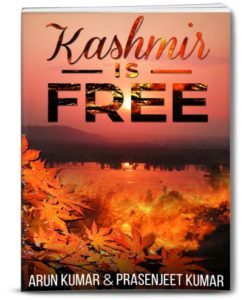
Just imagine the unimaginable. India walks out of Kashmirand makes Kashmir free.
Huh?!
How is that possible?
Why should that happen?
And how could that seemingly impossible situation be broughtabout?
And wait … what happens to the regions of Jammu and Ladakh… and how will they react?
And what happens to the Kashmir Valley once it achieves itslong-cherished goal of independence?
KASHMIR THINKS IT’S FREE (Book 2 of the KASHMIR IS FREE Trilogy)
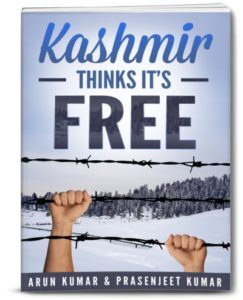
Kashmir finally has what its stone pelting mobs haveapparently been demanding for such a long time. FREEDOM. Now what?
What does Hasina Ittoo, its Chief Minister “promotedovernight” as Prime Minister, do? Beg India for a Bhutan like status with theIndian Army defending it; or request Pakistan for a similar status as that ofits so-called region of “Azad Kashmir”?
What does India do: treat Kashmir like Bhutan or Nepal withfree trade and visa-free movement of people or treat it like Pakistan withmassive restrictions on everything imaginable?
And how do the Kashmiris carry on with their daily lives?Where from do they get their food supplies, electricity, petroleum products,medicines, car parts, building material, and every such item of daily use?Which airline and mobile companies now service them? Which currency do they usenow: Indian, Pakistani, or both? Who pays now for the bloated bureaucracy ofKashmir? Pakistan?
Does Shehla Kaloo, the firebrand Kashmiri feminist, succeedin turning Kashmir in to a neutral but prosperous Switzerland? Or, does sheyield to popular sentiments in favour of a Sharia-governed Islamist society?
KASHMIR IS FREE FINALLY (Book 3 of the KASHMIR IS FREE TRILOGY)
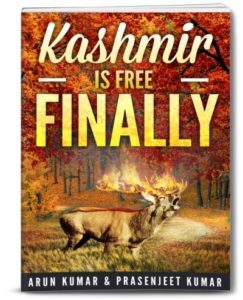
Kashmir problem exists because Pakistan exists. So, will Kashmir problem be over if Pakistan disappears?
India has already walked out of Kashmir and made Kashmir FREE.Soon “popular sentiments” turn in favour of a Sharia-governed Islamist society,and that leads to the ISIS taking over Kashmir.
Now they want to take their Gązwa-e-Hind—conqueringIndia—dream to the whole of India.
Now what?
Should India strike at the ISIS andre-occupy Kashmir? And then, should India take the war inside Pakistan andsplit Pakistan into five parts, say, Baloochistan, Sindh, Pakhtoonistan,Baltistan, and Punjab? But does it make any sense to spread Pakistan’s jihadifactories over five new states?
And can India really do this to anuclear Pakistan? And will Pakistan’s friends like USA, China, and Saudi Arabiajust wait and watch while India carries out this little exercise?
KASHMIR IS FREE TRILOGY is that fictional, what-if peep in to a not-too-distant future when all these questions get answered in a manner that will shock and awe you.
The post Kashmir is Free Trilogy appeared first on Publish With Prasen.
The Forbidden Truth Trilogy
If you liked the Lord of the Rings and the Game of Thrones,you will fall in love with THE FORBIDDEN TRUTH, too.
Season One
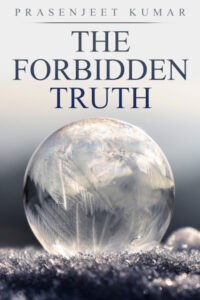
“If you know neitherthe enemy nor yourself, you will succumb in every battle.”
― Sun Tzu, The Art of War
Entangled in their own petty politics, the people of theRepublic of Sidua have forgotten who their real enemy is. Instead, they make speakingthe forbidden truth a punishable offence!
In the adjacent Kingdom of Malsia, Yosh and his men are askedto carry out an important mission. To find the Book of the Truth and destroyit. Because only the Book of the Truth can destroy them.
In the Siduan capital of Hema, Noora, a seventeen-year-oldlad too is entrusted with an immense task — to undertake a perilous journey tofind the Book of the Truth. For only the Book of Truth can save Sidua from itsenemies.
Thus, the stage is set for an epic battle for possessing theBook of the Truth.
Get set to ride a roller-coaster tale of adventure filledwith crystal balls and magical spells and find out if they can defeat theindomitable spirit of humankind.
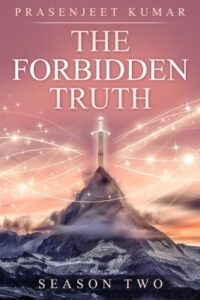
“When a nation refusesto admit they have an enemy, what’s the chance they’d be willing to protecttheir citizens from that enemy?”
– GeneralShoriveer, The Forbidden Truth, Season Two
In their quest for the Book of Truth, Noora and his teamreach Cynthia, the high altitude god-forsaken border town in the north ofSidua, somewhere in the mountain range of Sheenyuki.
The enemy is watching their every step and preparing for asurprise attack.
Surrounded and outnumbered, there is no way Yadu, Noora, andhis team can continue with their journey. They’ll have to fight the enemy headon. With no reinforcements to back them up. And what is worse: winters havestarted to set in. The bone-chilling harsh winters of Cynthia.
And who is this mysterious Dev, who has convinced everyonethat he’s their ally? Is he really what he says he is?
Can Yadu’s magic help? And what can the mythical, magicalSword of Sringeri do?
Get set to ride a roller-coaster tale of adventure filledwith magical spells and intriguing twists and turns at every step that’ll makeyou wonder who the good persons are and who are not.
Season Finale
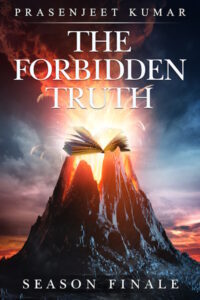
If you wished Harry Potter had a message, read on …
God would say:
Stop going into thosedark, cold temples that you built yourself and saying they are my house. Myhouse is in the mountains, in the woods, rivers, lakes, beaches. That’s where Ilive and there I express my love for you.
— Baruch Spinoza
The corrupt Government of Sidua has invoked an evil spell tocontrol the minds of its people. So, they can hide their incompetence and becomerich and richer.
What can reverse this spell and stop the Government of Siduain its tracks? The elusive Book of Truth.
Meanwhile, Drabu, the one-and-only prophet of Malsia, isplanning a massive invasion of Sidua. Who can foil Drabu? Again, the sametop-secret Book of Truth.
In the story carried forward from THE FORBIDDEN TRUTH booksI and II, Noora, Ila, and Yadu continue with their epic search for the illusoryBook of Truth. With every step, their journey becomes even moreperilous, impractical, and utterly frustrating.
Will they ever find the fabled Book of Truth? Or willthey watch their beloved homeland reduced to slavery once again?
Get set to ride a roller-coaster tale of adventure filledwith magical spells, mountain giants, wizards, and intriguing twists and turnsat every step.
Witness the epic and eternal battle between an inclusiveculture and an exclusive one, between nature worshippers and the so-called one-and-onlyone true God, and decide who you would rather be with.
The post The Forbidden Truth Trilogy appeared first on Publish With Prasen.
June 7, 2020
Being a Translator on Babelcube—Does It Work?
As an author, I’ve been privileged to have as many as 64 titles (as of June 2020, and counting, which should be a record!) translated through Babelcube in six languages like French, German, Italian, Japanese, Spanish, and Portuguese. There is ample reason, therefore, for me to be rather pleased with this platform, notwithstanding the fact that the site has a few glitches, which I’ve already discussed here and here. There is no doubt that had Babelcube not existed, I could neither have so many titles translated nor could reach the non-English speaking market in as many as 50 countries.

In fact, I even wrote a book “How to Translate Your Books WITHOUT SPENDING A DIME” where I detail my experiences of working with both Babelcube and its team of translators. However, that book was written purely from my, the author’s, perspective. Funnily, I soon realised that more translators were reading my book than authors!
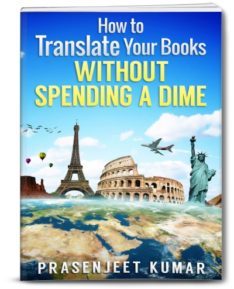
So, today’s blog
interview is all about the translator’s perspective—what is it that attracts
them to Babelcube, and what they can get out of it. Also, we address some
common concerns— the biggest being that translators get paid ‘very little’ in
the Babelcube scheme of things.
I need to address
this, because many translators have contacted me and complained that they’ve
earned very little on Babelcube. Some say they have translated like four books
and have made only ten dollars so far. It’s heart-breaking to hear this.
To get some
perspective on this issue, I decided to do some short-written interviews with
translators who have been very active on Babelcube in the past few years.
In that background, let’s welcome our first guest — Marcela Gutiérrez Bravo.

Marcela is a prolific translator who has translated over 100 books through Babelcube, and is still going strong. I’ve worked with Marcela, and it was a very pleasant experience getting her to translate two of my books into Spanish (Mexican)—Celebrating Quiet People and Quiet Phoenix.
In the interview that
follows we discuss what motivates her, some other benefits she finds in using
Babelcube over other sites, and the things you can do if you’re not very happy
with Babelcube.
N.B. I’m publishing this interview verbatim. So,
please focus on the content than the language.
Prasenjeet: Since when did you start using
Babelcube, and what were the benefits you found as a translator?
Marcela: I started
back in 2014, I had not economic benefits and I wasn’t expecting them. I
actually started due to the fact that I love reading and I wanted to put my
second languages to the test.
Prasenjeet: What is your opinion about
Babelcube’s split/share royalty model versus being paid upfront like on
Fiverr.com, elance.com or paypeopleperhour.com?
Marcela: I worked with
fiverr too, but I like better the way I work in Babelcube just because I can
choose the texts I am going to translate.
I hate to be bored
with anything I cannot learn from.
Prasenjeet: Is it possible to make a living as
a translator from Babelcube alone? Is it a number’s game (i.e. the more books
you translate, the more your income increases)?
Marcela: It has to do
with several facts. It seems that translations to French are better sold, also
the book has to be attractive in all ways.
The team to sell among the writer and the translator counts too.
I don’t think it is a
great income. Actually it isn’t. Most of the times, but this is one of my
hobbies and that’s why I enjoy doing it and earning so little money. I have translated more than one hundred books
and I am doing about 300 USD a month since the first year.
Prasenjeet: Do you see any benefits in opening
multiple accounts (i.e. like one on Babelcube, one on Fiverr or elance.com or paypeopleperhour.com)?
Is it easier to find work on Babelcube than on other sites?
Marcela: I had to give
up to fiverr, I had to BE there and ready.
But if there is a need for work, well, that is up to every translator.
What I like the most about bc (Babelcube) is that my name appears on line as a
Translator and I have obtained other jobs due to that.
Now I only work with bc
(Babelcube), but I also have a bookshop where I translate (my other income).
Prasenjeet: What are the other benefits to
using Babelcube? I’ve seen translators applying for a job with a translation
company after their work experience with Babelcube? Can experience with
Babelcube help you in getting a job with a translation firm? What is your take
on this?
Marcela: As I said
before, yes.
I could teach in a
University thanks to these books I translated. I am also a writer, and these
add to my curriculum.
I really enjoy these
benefits although it is not very easy to obtain them. I am just fortunate for having this “vice”.
Prasenjeet: Thank you so much, Marcela. I hope your
experience motivates other translators.
—End of interview—
That’s interesting. $300
a month after translating 100 books may not sound much, but the benefits of reading
what you like, embellishing your CV, and landing other better-paying work are
factors that shouldn’t be ignored.
If you are a
translator on Babelcube, therefore, I would like to learn from your experience.
Please leave a comment below, and let me know if you like using Babelcube. Or,
what else have you considered other than Babelcube? Would love to hear. Bye.
The post Being a Translator on Babelcube—Does It Work? appeared first on Publish With Prasen.
July 7, 2018
How Not to use Amazon Ads
 I started experimenting with Amazon Ads in April 2017 — yes, I was one of those perennially sceptic/ late bloomers, who take time to jump on any bandwagon! But after playing around with it for over a year, I’m now a full convert. During this journey, I’ve learnt a few things, exchanged notes about other writers’ experiences, and have had some success that I just can’t ignore.
I started experimenting with Amazon Ads in April 2017 — yes, I was one of those perennially sceptic/ late bloomers, who take time to jump on any bandwagon! But after playing around with it for over a year, I’m now a full convert. During this journey, I’ve learnt a few things, exchanged notes about other writers’ experiences, and have had some success that I just can’t ignore.
So, here’s my two-bit on how you SHOULDN’T use Amazon Ads.
First, don’t expect to become a millionaire overnight: Okay, you may have heard of fantastic stories of authors who sold millions of books just by using Amazon Ads. But if that is your expectation, you’re setting yourself up for failure. From Day 1. My goal always was to sell a few books here and there and also to get a good ROI so that I was never out-of-pocket. If that is your aim, please read on.
In 2017-18, I spent around $100 on Amazon Ads that according to its Dashboard (actually it was KDP and Createspace dashboard) resulted in almost $700 in sales. Yes, I didn’t become a celebrity. But I’m happy because I made a profit of $7 for every dollar I spent on advertising. And I never had such a boost in my four-year writing career. I have shared my experiences elsewhere of dabbling with FREE, or 99 cent promotions, of buying advertising space on Fussy Librarian and so many other sites I don’t even remember now; but the point to underline is: I never had such a good ROI on any other platform.
Bid high if you’re rich: I cannot tell you how many Discussion Forums and Kindle Boards discuss how high authors are currently bidding. Most begin with a decent bid and start immediately checking their Ads Dashboard. Now if they think they aren’t getting the expected number of impressions or clicks, they become uneasy. So, they raise their bids to as high as $1 per click. Again, nothing happens, except that after fifteen days, Amazon bills them $100 which resulted in $20 worth of sales. Ouch! Don’t do this. This is the price you pay for becoming impatient.
When I started Amazon Ads, I too used to bid high, to around 50 cents per click. I soon realised that not only was I losing money, but I was also blowing up my entire monthly budget in ten days flat. I had to course-correct and now, my ads are anywhere between 5 cents to 20 cents. Funnily, some ads do really well at 5 cents! Take a look at this screenshot.

Yes, I don’t get as many clicks and impressions as I used to get but now I can leave my ads up indefinitely without worrying about getting a hefty bill. Incidentally, this idea I picked up from Brian D. Meeks book on Mastering Amazon Ads. [image error]
Amazon doesn’t show my ads, maybe they have something against me: If your dashboard says the ad is running, it is running. Relax and don’t fret about it. Many authors check their dashboard every day and worry that they’ve stopped getting impressions and clicks. They panic and increase their bids which can finish them financially sooner than later.
Understand there is always a lag in reporting. And that lag can be from a few days to even a few weeks. Or months or years. So, don’t worry. I’ve managed to pick up sales even on those ads I once considered dead. And whenever I check my book pages on Amazon, I do see them running even though the dashboard isn’t reporting any impressions or clicks. So, I take it they’re running.
Another tip: Don’t check your ads dashboard daily. Leave your ads up. If you’re bidding low, you’re probably not losing money. Check once in a week or better, once in month. And tally the results with your Kindle and CreateSpace sales.
I’m getting clicks but not sales; so readers don’t like me: Always remember that readers are not in a hurry. I can’t tell you how many times I’ve found interesting books through Amazon Ads that I didn’t buy immediately. I’m sure you do the same. Usually, I add that book to my wish list or download a sample on my Kindle. So, why should I fret if readers are not buying my books immediately but only adding those books to their wish lists?
That being said, there could be some other reasons you’re getting clicks but not sales (assuming your cover, blurb, interior and opening are okay).
Remember Amazon links last for 14 days: So, if a buyer clicks on a link, say on 1 November, and buys the book on 20 November, the sale won’t get credited against that link. But a sale is a sale, so why worry.
The sale may happen outside Amazon.com: At present, authors can only run ads on Amazon.com and not on any other Amazon site. But readers from around the world go to Amazon.com, because it is so huge, and it has so many more user reviews. I’ve noticed that when I run my ads, I get sales in Europe and India also which I didn’t earlier. So, it’s possible that those readers came across the ad on Amazon.com and then bought the book on Amazon.in or de or uk. BUT since the sale didn’t happen on Amazon.com, it won’t be credited.
Have you ever seen an ad on TV for a free product? No? So, if you run a FREE or 99 cent promotion on Amazon Ads, you will guarantee getting a negative ROI. The lesson: the higher the price, the better would be the margin. For novels, your price should be at least $4.99 to get a good return. Print books too do well. So do box sets priced anywhere from $7.99-$9.99. For a longer discussion on why FREE and 99 cent books do not work, do feel free to check out my book How to Market Your Books WITHOUT SPENDING A DIME.
I hope this blog post helps you in identifying where you may be going wrong with Amazon Ads. The key is to bid low, leave your ads up and check your dashboard once in a month.
And use the rest of the time to do what you love doing. Writing, I hope.
The post How Not to use Amazon Ads appeared first on Publish With Prasen.
October 19, 2017
For the Heart: 7 tales of Romance
“Morning without you is a dwindled dawn,” Emily Dickinson
“There is no instinct like that of the heart,” Lord Byron
Guys, I’m feeling a little mushy because I’m in a fantastic new bundle of seven books with one of my “Romance in India” novels, Love Karma Crossed. If you love reading romance novels, don’t let this GREAT OFFER slip away.
This amazing bundle consists of:
1) “Shooting for the Moon” by D. H. Hendrickson
2) “Where Dreams Are Born” by M. L. Buchman
3) “Love Karma Crossed” by Prasenjeet Kumar
4) “Flawless” By Jan Moran
5) “Second Spring” by Karen L. Abrahamson
6) “Applegate Farm” by N.W. Moors
7) “Heart Strings” by Maggie Jaimeson
You can buy the bundle from bundlerabbit directly or from Amazon, Kobo, iTunes or any of your favourite e-book venders. Click here to check out.
The post For the Heart: 7 tales of Romance appeared first on Publish With Prasen.
August 27, 2017
Think of Writing as playing Angry Birds
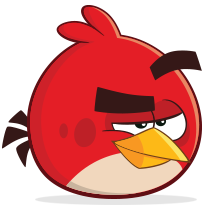 Few weeks back, I stumbled across a blogpost by one writer I follow occasionally. This gent used to blog frequently about his sales and the things he had learnt in the process of “engineering” those sales. I was naturally curious to know about the marketing techniques that may have worked for him.
Few weeks back, I stumbled across a blogpost by one writer I follow occasionally. This gent used to blog frequently about his sales and the things he had learnt in the process of “engineering” those sales. I was naturally curious to know about the marketing techniques that may have worked for him.
Interestingly, this writer also talked about “mental toughness,” and how the writing profession was NOT meant for people who were faint-hearted. I agreed with him.
Unfortunately, a few weeks back, this writer met with an accident. He says his Amazon sales weren’t enough to pay for his treatment. So, he took up a “pay check.” I’m not sure what that means, but looks like he’s into freelance writing because he claims to have not one but several pay checks.
But he said something else on his blog which caught my attention. He said readers don’t care. He also said he had published nothing in a while and nobody contacted him asking when is your next book coming out?
The despondency was becoming intense. I had a sneaking feeling that he was going to quit soon. And there you go, he almost said that in his last blog post.
You may ask—how did I know he would quit soon?
Now I’m no oracle. But the answer is simple—if you’re going to write regularly that readers don’t care and that nobody knows you exist, very soon you will believe it yourself and quit writing.
So, here’s the big lesson. If you want to keep yourself motivated, write things to motivate yourself. Like this blog, on which you will not find even a single whining article. That’s because I don’t think “Whining is a good business model,” to borrow Kristine Kathryn Rusch’s terminology.
I write to motivate myself (non-fiction) and entertain myself (fiction), which brings me to the topic of the day.
I was flicking through an Indian magazine and came across this interesting article by Bollywood actor Sushant Singh Rajput titled, “The Struggling Actor’s Guide to making it big in Bollywood.” I know most of you visiting this blog are not from India and won’t even know this actor. But that is not important.
The title evoked my curiosity. I’m not an actor (even though I acted in my Uni days and even won an award), but I thought we, artists, can always learn from each other. In that article, Sushant talked about his love for acting and his struggling days. It was interesting that he called those days as a journey.
There were a few things that popped out for me. I’ll be describing them in some detail here and try to apply them to the writing career.
Don’t be over analytical: Sushant says, “People will tell you that making it big requires hard work, perseverance, dedication and skill development but all you need is the love for it. It is like playing a video game—when you are totally into it, focusing on one level at a time and loving it, that’s when you’ll do your best.”
I’m not sure about you but this is so true for me. Yes, writing is definitely about skills, and there are plenty of mind-boggling techniques that can be employed to tell a story which I need not elaborate here.
Many writers get demoralised at this stage. They think their writing is “crap.” But actually, what you really need is a love for story. Mind you, I said love for story and not story-telling. I’m presuming you are in this profession because you love a good story. Whether it’s for a novel or a movie or a video game—it doesn’t matter.
And the most interesting thing is that Sushant sees his acting career in terms of playing a video game. I cannot agree more. I too can see writing fiction as playing a video game. You have a main problem and you’ve to find ways to resolve that. Yes, you’ll be crossing from one level to another (I call that scenes). And yes, there would be some scenes where you’ll get stuck or which will frustrate you, but that happens even in a video game. It’s part of the fun. So, why not have fun writing, just as you would with Angry Birds?
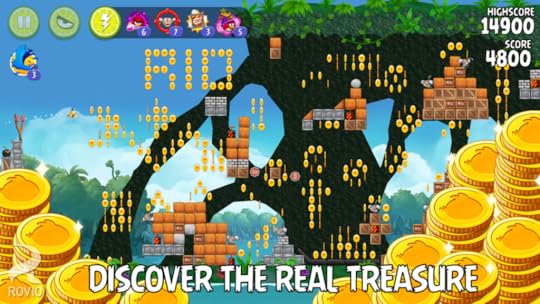
I think I’ve been the happiest when I was writing from heart. The joy I get from writing is the same as the joy Buddha described when he attained enlightenment. And I’m not kidding.
I write because it makes me happy. I write because it feels like magic. When you start, you may just have a blank MS-Word document (or Scrivener file) in front of you. You put something down and voila! You have characters who are no longer just names on a computer screen or on a piece of paper, but real human beings. You have a setting which is not just the name of a place but an actual living, breathing, space. And the journey your characters take feels so real. It’s magic. Really.
Don’t do it for fame or money: The next thing Sushant says, “Ask yourself why you want to do it. I really, absolutely love what I do. If your answer is fame or money, it is not going to work. I come from a middle-class family and there are things I couldn’t afford earlier. I though it is the money that is keeping me from being happy, but is not the case. In this profession, if you make it to a certain level, you will have money and fame. But if that is your motivation, then what will you do next? You can’t get more famous after a point and then it becomes a flat graph. It will then fail to make you happy.”
Okay, I’m taking a deep breath. I think no one becomes a writer for fame or money. Although they all secretly pine for both!
Writing is an unusual profession. When your friends, family members or strangers ask what you do, their first response usually is, “Are you making a living?” It’s commonly believed writers don’t make any money. So, you have to be in this unusual profession ONLY because you love writing.
I’m not saying you cannot make a living writing fiction. There are plenty of writers who do that with ease.
My biggest takeaway is this—even if one of my books sells a billion copies, I’ll still keep on writing. Because writing is like oxygen to me.
Enjoy the Journey: The last thing Sushant says, “Don’t concentrate on ‘how to get there,’ instead enjoy the getting there. I didn’t plan my career and I don’t think that now that I have a sea-facing house in Bandra, I am in a more secure position than I was in the IRK apartment. There are too many variables in the working. I don’t extend my time to future: it is the present, the now, that I am enjoying.”
Whenever I get depressed that readers are not reading my work or sales are not up to the mark, I remind myself to see my career as a journey. There are too many ifs and buts in this profession and sales do go up and down. In fact, when sales go up, assume they’ll go down. Nobody can predict the future.
But what we can all do is to focus on the present, and the NOW. Focus on your story and nothing else.
I hope I’ve motivated you enough for today. Now go back and write your story!
And don’t forget to enjoy yourself!
The post Think of Writing as playing Angry Birds appeared first on Publish With Prasen.
July 9, 2017
Negotiating a Traditional Publishing Contract—To Sign or Not Sign Away Your World Rights
You know, what is the biggest mistake writers can make? It’s not typos in a book or bad formatting which you can all fix with a little diligence. But it is signing a bad contract and giving away all your rights to someone else so that that person makes money and NOT you.

Contracts are everywhere. They are unavoidable. As an indie author, you may think you have never signed a contract or may never need to, but the reality is that if you are published anywhere, you would have signed many contracts.
For example, you are bound by KDP’s agreement when you published your book to Amazon. The same is true with Smashwords, Draft2digital, Kobo, iBooks, Google Play, Babelcube etc. etc. etc.
In the future, you may want to tap newer foreign markets, and for that you may have to sign a contract with a foreign publisher. Therefore, you must understand what you’re signing away. You must also determine whether the deal you’re being offered is a good deal or a bad one.
And that can only happen if you educate yourself. I’m thankful to Kristine Kathryn Rusch’s blog that really educated me about the various terms used in traditional publishing contracts and the pitfalls to avoid.
Kristine has over forty years of experience dealing with both traditional and indie publishers for publishing her books.
So it should be worth your while to, first, familiarise yourself with those different terms used in a traditional publishing contract which you can easily find on Kristine’s blog.
I am going to start a series of blog posts where I’m going to talk about my experiences in negotiating a traditional publishing contract with an Indian publishing house.
I’m not giving legal advice though. Even though I have practised as a lawyer for two years, I don’t think I’m in any way competent to give you legal advice regarding IP contracts.
Yes, it is possible to negotiate a contract with a traditional publisher. But you must be willing to walk away if the negotiations fail. Contracts form the basis of any business. And writing, whether you like it or not, is a business at its core.
So if a publisher refuses to accept your terms and conditions, you should say, “No.” Walk away from that deal and wait for a better one. Never sign a contract in desperation.
Anyway back to the main topic. As you know I’m 100% indie. So why did I need to go to a traditional publisher, you may ask?
Well, because we needed to get my mom’s memoir printed and distributed in India. Her target audience is India and 95% of the book market in India is still print. Paperbacks in India are usually priced anywhere from $1 to $6.
And so nobody is willing to spend $20 for a print book from CreateSpace, and on top of that wait for about three weeks to get that copy shipped from the United States to India.
So we contacted this small publisher in Delhi to make my mom’s book available in print in India.
This publishing house specialises in publishing manuscripts from bureaucrats and police officers that expose corruption and maladministration in the government. And since my mom is a retired government servant, her memoir fitted this “genre” perfectly.
We were very clear we wanted to retain all other rights—eBook, audio, translation and other subsidiary rights (including film and media rights). We wanted to license only those rights that were needed to get my mom’s book available in print in India at a reasonable price.
Following Kris’ advice, all of us read the entire “standard” contract word by word. And no doubt, it was lopsided, tilted quite unapologetically in the favour of the publisher. Fortunately, it didn’t have a non-compete clause, options clause or an agent’s clause (as we didn’t go through an agent).
But it was still grabbing our world rights, in all formats, and in all languages, even though the publisher had no wherewithal to publish in territories in North America or Europe. Why, he wasn’t even publishing eBooks on a regular basis for all his titles!
Here is the exact clause from the contract. I’m also highlighting the problematic words.
“The Author (s) have supplied the work for publication to the publisher and hereby grant (s) to the Publisher, as per the Publisher’s terms & conditions, the full and exclusive right on the terms specified in this agreement, to print, publish, and to sell the work and all subsequent revisions and adaptations thereof throughout the world in all languages, in hard or soft cover (including in electronic or digital form) and in text, trade, reprint, and other editions and to dispose of all subsidiary rights thereto in all languages.”
Some authors get excited (in the wrong way) reading such a clause. They think the publisher is going to publish their books throughout the world and even get the book translated in all languages.
Well, this small publisher had no presence beyond India. He also had no way of getting the book translated in to, say, Italian, Spanish or French.
He hardly knew what Kindle is. No kidding.
Yet, he had no qualms about grabbing as many rights as possible.
So going back to negotiation. First and foremost, delete anything that makes little sense. Second, negotiate via e-mail. It’s easier to think coolly and rationally when you are composing an e-mail than when you have to negotiate face-to-face.
Here is a list of recommended changes:
* As per the Publishers’ terms & conditions: In the same paragraph, we found an inconsistency. In Line 2, it said “as per the Publisher’s terms & conditions” and in Line 3 “terms specified in this agreement.” Do they mean the same thing? Or does the publisher have a separate set of terms & conditions NOT attached with the contract but hidden somewhere in his cupboard with some other skeletons! Now we could have asked the publisher but that would simply be a waste of time. The words Publishers’ terms & conditions in line 2, in our opinion, were unnecessary. So we deleted it.
* World: We changed that to India. It was later negotiated to South Asia (including Afghanistan) and a few more territories such as the UAE and Mauritius.
* All languages: We changed this to English language ONLY. In negotiations, the publisher said he wanted to translate the book in Hindi and Urdu as well. At the present moment, we have no way of getting our book translated in Hindi or Urdu, so we were fine with it. You may ask: What if the publisher never translates the book in Hindi or Urdu? That we’ll deal separately in a future blog post.
* including electronic or digital form: We deleted that. We didn’t want to license our eBook and other digital rights because we thought we could handle these better ourselves. Also the publisher was stuck at the 10% Royalty level for these rights too, when we could get 60-70% otherwise.
* Other editions: We made it to “Other Print editions” throughout the agreement. The term Other editions is too broad and by accident shouldn’t include eBook, translations or anything else. So, we considered it prudent to make these words as specific as possible.
* All subsidiary rights thereto in all languages: Subsidiary rights include everything like games, TV, film, and other media rights. So we deleted the phrase altogether.
This is how the new clause looked like:
“The Author (s) have supplied the work for publication to the publisher and hereby grant (s) to the Publisher, the full and exclusive right on the terms specified in this agreement, to print, publish, and to sell the work and all subsequent revisions and adaptations thereof only for South Asia, Afghanistan, Mauritius and UAE in English, Hindi, Urdu languages, in hard or soft cover and in text, trade, reprint, and other Print editions.”
In the next blog post, we’ll deal with film and media rights.
Do let me know if you agree with our strategy.
And please do feel free to leave your comments/suggestions below.
The post Negotiating a Traditional Publishing Contract—To Sign or Not Sign Away Your World Rights appeared first on Publish With Prasen.
April 29, 2017
Time sensitive: Ultimate Guides to Indie Publishing Bundle
Just to let you know about an amazing bundle of six books and resources for writers that is only available for a limited time.
Disclaimer: The Bundle also contains two of my books.
“Create Your Book Start to Finish” by Mary C. Blowers
“Business for Breakfast, Volume 1” by Leah Cutter
“Business for Breakfast, Volume 3” by Blaze Ward
“Playing the Short Game” by Douglas Smith
“How to be an Author Entrepreneur Without Spending a Dime” by Prasenjeet Kumar
“How to Market Your Books Without Spending a Dime” by Prasenjeet Kumar
Pay a minimum of $5.99 USD and receive all 6 e-books. This option is also available at Kobo, Amazon, iBooks, and Barnes & Noble.
Click here to check out the Ultimate Guides to Indie Publishing Bundle.
The post Time sensitive: Ultimate Guides to Indie Publishing Bundle appeared first on Publish With Prasen.
April 16, 2017
Writing my Fourth Romance Novel “You Can’t Kill My Love”
[image error]I am happy to announce that my latest novel “You Can’t Kill My Love: A Kashmir Holocaust Love Story” is now published to Amazon, Kobo, iTunes, Google Play and other e-Book platforms.
I must admit it was for me a hugely emotional roller coaster ride getting this 67, 000 word story out.
But I’m so glad I wrote this book. Straight from the heart. And pouring out every bit of my personal association with Kashmir from the time I was born.
I do hope you will be equally entertained if you decide to read it. 
March 25, 2017
How to promote your books on Kobo: WITHOUT SPENDING A DIME

I recently realised that there could be tons of marketing opportunities outside Amazon.
That was a discovery. Because from the time I started indie publishing my books in 2013, I had heard that Amazon is the only e-book retailer that provides marketing tools to authors. Especially when you join its KDP Select programme.
That others don’t care about you.
Well, that is no longer true. Kobo too offers marketing or rather merchandising opportunities to its authors.
But wait a minute—isn’t merchandising offered ONLY to well-established authors? The ones who sell hundreds of thousands of books? What if you are in no such league?
Well, Kobo has a programme for authors—regardless of whether you sell well or don’t sell at all. And surprisingly, it’s the same programme that Kobo offers to traditional publishers.
However, to qualify you need to go directly to Kobo. If you have been publishing your books through Draft2Digital or Smashwords, you won’t have access to the programme.
Unpublishing from Draft2Digital or Smashwords is easy. Just go to your dashboard, uncheck the box to delist the book from Kobo and simply re-publish again. Your books will disappear from Kobo within 24 hours (my experience on Draft2Digital) or it may take 24 years (just kidding).
Next, publish your books through Kobo Writing Life. I download the e-pub file from Draft2Digital and upload the same file on Kobo. So there is no hassle of uploading your MS-Word document, reconverting it to e-pub, fixing errors and so on. All the pain in the *** stuff.
That done, don’t start looking around for the “promotion tab” in your dashboard. That doesn’t happen automatically.
For that, you’ll have to e-mail Kobo Writing Life and tell them you want to be included in their Beta programme for authors. In my experience, the Kobo Writing Life team is very helpful and they create a promotion tab within 24 hours which you can then access through your dashboard.
Once this is done, you can easily apply for tons and tons of promotional opportunities. There are some opportunities which are special—such as April 30% off or UK top 200. Please note that the books accepted for promotions are all curated. The Kobo team looks at your cover, blurb, interiors (maybe) and pricing. And if they reject your book, they also let you know the reason.
There are two kinds of promotions on Kobo—one where you pay upfront (ranging from $5 to $80) and another where Kobo charges additional 10% from your sales (so instead of making 70%, you’ll make 60%). That way, you have a poor man’s BookBub, at NO upfront cost.
Recently, Kobo approved two of my books for promotion. Celebrating Quiet People for Kobo Next—Fiction and Non-fiction and When Ganges Met the North Sea—for Romance Deals Page Spotlight. Both cost a 10% reduction in royalty rate. ONLY.

I’m not sure how the promotions will go. Butterflies in my stomach. Stories range from phenomenal success to phenomenal failure and everything in between. Hey, but that’s true about any promotion. Even a 5 day free book promotion on KDP Select. Or a sell-your-soul promotion on the BookBub. Isn’t it?
Even if my promotions are in the phenomenal failure category (which usually they are!), I would not have lost anything. Not even money. Because Kobo makes money ONLY when I make money.
So there is nothing to lose. As I keep saying on my blog, I am all for any kind of marketing strategy that you can experiment with WITHOUT SPENDING A DIME.
So go ahead and experiment with promotions on Kobo. And let me know how it went.
And have a nice weekend!
The post How to promote your books on Kobo: WITHOUT SPENDING A DIME appeared first on Publish With Prasen.





